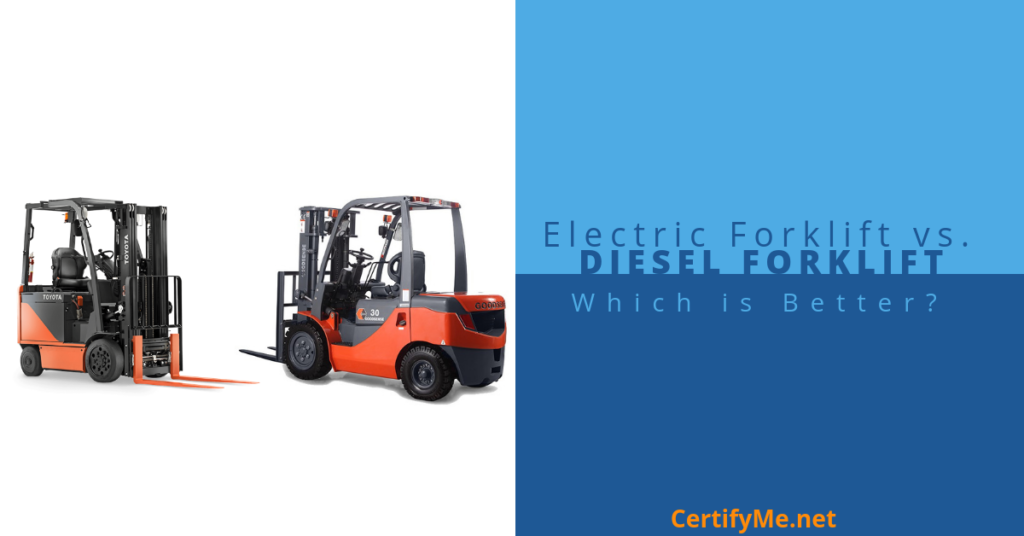Diesel vs Electric Forklifts: Which Is Right for Your Workplace?
Posted by: admin on April 15, 2025

Choosing between diesel forklifts and electric forklifts impacts more than your warehouse floor—it affects your bottom line, worker safety, and environmental footprint. Businesses comparing diesel vs electric forklifts need clear, side-by-side insights to make the best decision. Understanding the advantages and tradeoffs of each option leads to smarter investments and safer operations.
Diesel vs Electric Forklift Debate
Diesel and electric forklifts serve the same basic function: lifting and transporting heavy goods efficiently. However, differences in fuel type, power delivery, maintenance needs, and emissions control set them apart. Diesel forklifts often dominate outdoor and heavy-duty jobsites, while electric forklifts are favored for indoor use and eco-conscious operations. Evaluating operational costs, workspace environments, and workload demands helps identify the better fit for your business.
Quick Comparison: Diesel vs Electric Forklifts
- Power: Diesel forklifts deliver superior torque, essential for outdoor and rugged terrain tasks. Electric forklifts provide quieter operation with precise maneuverability.
- Cost of Ownership: Diesel units incur higher maintenance and fuel costs. Electric models offer lower energy costs and fewer mechanical breakdowns.
- Environmental Impact: Diesel forklifts release harmful emissions, making them less suitable for indoor operations. Electric forklifts produce zero emissions at the point of use.
- Indoor vs Outdoor Suitability: Diesel excels outdoors, handling uneven ground and harsh weather. Electric forklifts thrive indoors due to clean energy operation and smaller frames.
- Lifespan and Durability: Diesel forklifts often last longer under harsh conditions but require more frequent maintenance than electric units.
Diesel Forklifts: Pros and Cons
Advantages
- High lifting capacity and towing power
- Excellent for uneven, outdoor environments
- Quick refueling compared to battery charging
Disadvantages
- Produces emissions hazardous for indoor air quality
- Higher long-term operating and maintenance costs
- Generates more noise, requiring enhanced workplace communication
Electric Forklifts: Pros and Cons
Advantages
- Zero emissions promote better indoor air quality
- Lower noise levels improve safety and comfort
- Fewer moving parts mean lower maintenance expenses
Disadvantages
- Limited outdoor usability
- Longer battery charging times compared to diesel refueling
- Higher initial investment for batteries and charging stations
Which Forklift Type Is Best for You?
Choosing between diesel or electric forklifts depends on several factors:
- Usage Environment: Outdoor sites favor diesel; indoor warehouses favor electric.
- Load Capacity Needs: Diesel handles heavier loads with greater efficiency.
- Fuel Access: Facilities with easy access to diesel fuel may find diesel forklifts more convenient.
- Operating Hours: Businesses running multiple shifts may prefer diesel to avoid battery charging delays.
Cost comparisons over time show that electric forklifts often yield lower lifetime costs despite a higher upfront investment.
Diesel and Electric Forklift Certification Requirements
OSHA requires all forklift operators to be trained and certified on the specific type of lift they operate. Whether using diesel, electric, or both, operators must understand each vehicle’s unique handling characteristics, safety protocols, and maintenance needs. Certification ensures compliance, reduces accidents, and increases operational efficiency.
FAQs on Diesel vs Electric Forklifts
Which Forklift Has Lower Long-Term Costs?
Electric forklifts usually present lower total ownership costs due to reduced fuel and maintenance expenses.
Are Electric Forklifts Better for Small Warehouses?
Yes. Electric forklifts excel in tight indoor spaces thanks to compact designs and zero emissions.
How Long Does It Take to Recharge an Electric Forklift Battery?
Recharge times vary but generally require six to eight hours for a full charge cycle, depending on the battery size and charger type.
Get Certified with CertifyMe
CertifyMe offers OSHA-compliant forklift certification programs tailored to both diesel and electric forklifts. Our online courses provide fast, flexible learning with 24/7 access, making it easy to certify your team without downtime. Plus, we offer free three-year renewals, ensuring that your workforce stays compliant and confident operating any type of forklift.
Welcome to CertifyMe.net
CertifyMe.net has offered online forklift certification since 1999. With Our Convenient online program. your employess can earn their certification in an hour or less.
Browse Online Certifications:
This low-cost program can be compeleted anytime, anywhere!






